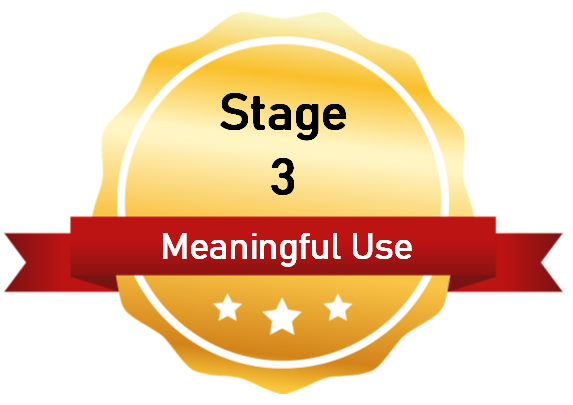Are you in the market for an electronic health record (EHR) software for your behavioral health or addiction center? If so, you may have seen some vendors advertise that their EHR is Meaningful Use (MU) 3 certified.
Similar to an “A” health inspection rating in a restaurant’s front window, you probably have a sense that an MU certification is a good thing, but may not have much idea of what it entails.
Rest assured that the staff at an EHR vendor works diligently to deliver a platform that meets the standards of MU 3 certification.
If an EHR vendor is Meaningful Use Stage 3 certified, you can trust that their processes are designed to optimize your facility’s functionality.
This article first provides a brief history of the the three stages of Meaningful Use.
Then, it explores the benefits of using an EHR certified in the most current version of Meaningful Use, Stage 3.
Brief History of Meaningful Use
The Meaningful Use program has been around for almost a decade. Divided into three stages, they are a collection of objectives and requirements for EHRs to optimize their effectiveness for patient treatment.
First established in 2011, the objectives of Stage 1 centered around capturing and sharing data:
- To electronically capture health information in a structured configuration
- To use that captured information to monitor clinical conditions
- To communicate that information to facilitate care coordination
- To engage patients and families with EHR software
- To report on clinical quality measures (CQMs) and public health information
These goals were meant to set a foundation for future EHR use and adoption among the larger industry.
Stage 2 was originally released in 2013.
It built on the groundwork of Stage 1 by encouraging advanced clinical processes. It established more involved standards that promote the meaningful use of an EHR to further improve patient care.
It also emphasized the need for the exchange of health information to be as structured and as secure as possible. For example, two required features added to Stage 2 were:
Essentially, the intention of Stage 2 was to embrace the power of effective EHRs on a large scale.
Though the objectives and features required in Stages 1 and 2 are necessary for any successful platform, EHR vendors must now comply with the current guidelines of Stage 3 to earn an MU certification.
Meaningful Use Stage 3
Stage 3 consists of the most up-to-date standards that describe meaningful EHR use. First released in 2015, Stage 3 focused on using certified EHR technology (CEHRT) standards to improve treatment outcomes of health care facilities.
Some key requirements of Stage 3 are:
- Clinical decision support
- Computerized Provider Order Entry (CPOE)
- Patient access to health information
- Care coordination through patient engagement tools

Benefits of Meaningful Use 3 Certified EHRs
Though some of these objectives and requirements can seem a bit technical, they all work to create a highly functional EHR that is an asset to healthcare providers.
An EHR that has achieved Meaningful Use 3 certification comes approved by organizations that specialize in evaluating the ways in which EHRs optimize treatment.
No EHR vendor earns a Meaningful Use certification unless they demonstrate that their software is designed and used in a way that positively affects patient care.
By choosing an EHR that is Meaningful Use 3 certified, your facility will benefit in the following ways:
Financial Incentives for Your Organization
The Centers for Medicare & Medicaid Services (CMS) reward facilities that meet MU Stage 3 standards with potentially substantial financial reimbursement. Not only does adhering to the certification’s requirements serve your patients, it also serves your overall operation.
Comprehensive and Up-To-Date Data
Part of the structured format MU requires is an EHR’s ability to organize health information that updates automatically and in real-time. As a result, a certified EHR will always provide thorough and accurate health information for each patient.
Clinical Decision Support
EHRs that are MU Stage 3 certified provide automated assistance at the time of decision to make an informed treatment choice. For example, health care professionals may be warned of a patient’s allergy to a specific medication through an automated alert on their chart.
In an industry where facilities are managing more patients and digital information than ever before, decision support features are crucial. They ensure the safe treatment of patients, and take considerable pressure off clinicians to be 100% right 100% of the time.
The effectiveness of decision support features largely depend on how a vendor configures your operation’s workflows into its platform. Keep in mind that some EHRs are more configurable than others. Furthermore, different vendors involve end users in the creation of their workflows in different ways.
Regardless of the configuration process, though, the decision support feature of any EHR that is MU Stage 3 certified will help your organization:
- Trust that you offer a high quality of care
- Generate positive health outcomes
- Avoid treatment errors
- Improve overall efficiency and patient satisfaction
Enhanced Care Coordination
Stage 3 certification ensures that an EHR exhibits interoperability. In other words, the flow of a patient’s health information becomes easily shared with all necessary parties.
Positive Patient Engagement
In general, the Meaningful Use standards work to empower the patient to participate in their treatment. One example of this is the ways MU objectives promote the secure engagement of patients through a patient portal.
Allowing your patients to perform some steps of their treatment autonomously can free up staff to focus on more pressing matters.
Each EHR vendor will engage patients a little bit differently and offer a unique portal functionality. However, you can be confident that an EHR with an MU Stage 3 certification has the ability to improve your facility’s overall efficiency through effective patient engagement.
Healthier Patient Population
CMS collects valuable information from EHRs that are Meaningful Use certified. This can have positive repercussions throughout the health care industry. As CMS compiles that data, they can in turn improve their own processes and standards.
As a result, health care organizations all over can develop best practices, treatment options, and forms of care with the help of CMS’ collective database of EHR trial and error.
.jpg)
Find Meaning with AURA
We hope you have a better idea of what a Meaningful Use certification, well, means.
As you search for the right EHR for your organization, a Meaningful Use 3 certification is an endorsement you can trust in. If a vendor has made the effort to fulfill the MU 3 standards, it suggests they are committed to delivering comprehensive care.
In our case, AURA, Sigmund’s enterprise software solution, is Meaningful Use Stage 3 certified.
We believe in the Meaningful Use standards. In fact, their requirements are very much in line with the philosophy we had in mind when developing AURA. We are passionate about providing the highest quality of care and service to behavioral health and addiction treatment organizations.
Want to learn more on how AURA’s features meet MU standards? Feel free to reach out one of our knowledgable professionals today! And if you’d like to experience the clinical, medical and operational standards AURA meets in real-time, click here to schedule a demo!

